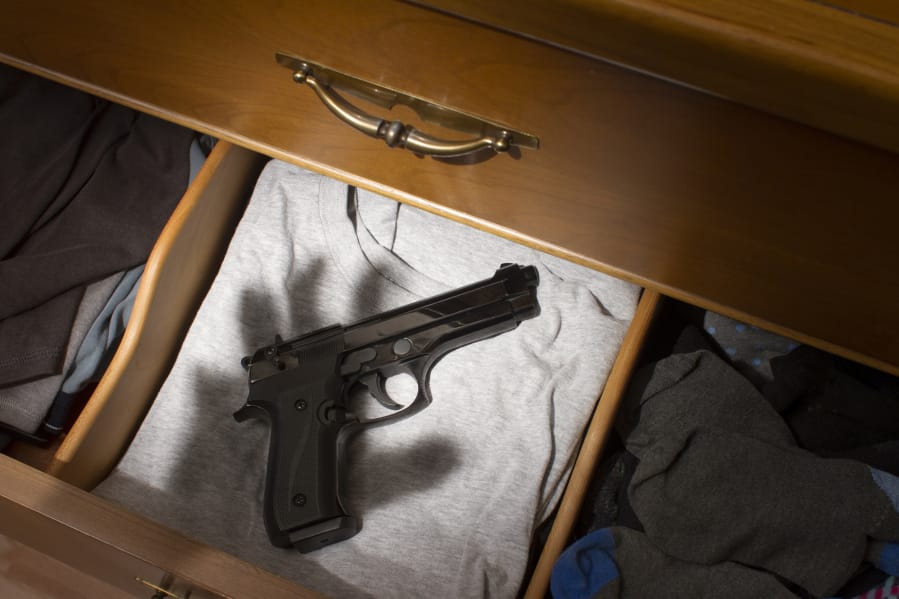SACRAMENTO, Calif. — California residents who own handguns are four times more likely to commit suicide than their neighbors who don’t own them, according to a study led by California researchers and released Thursday in The New England Journal of Medicine.
“Firearm owners were not more likely to die of other causes than non-owners,” said the study’s lead author, David Studdert, a professor of medicine and the law at Stanford University. “As a matter of fact, they were a little bit less likely.”
While women typically have far lower risk of suicide overall, this research found that they are 35 times more likely to kill themselves when they own a handgun.
“Women actually attempt suicide a lot more often than men,” Studdert said. “They have lower suicide rates, but they attempt more often. How is that possible? Well, they tend to use methods that are less lethal, like pharmaceuticals, and so they have a very low fatality rate, but if you drop a gun into that mix — higher attempt rates and suddenly a very lethal means — then you get this explosion in the rate of firearm suicides for women.”
Male handgun owners committed suicide at a rate nine times that of those who didn’t own a gun, according to study data, and Studdert noted that men account for the majority of firearm suicide.
So much of gun safety data have captured statistics on white males because they are the biggest buyers of firearms, Studdert said, but the vast cohort in this study allowed researchers to identify suicide trends for women.
This study is the most exhaustive one to date on the risk of suicide among handgun owners. While past studies looked at data on a few hundred suicides, Studdert and his team examined causes of death among 23.6 million California residents from Oct. 18, 2004, to Dec. 31, 2016. That included 676,425 individuals who acquired one or more handguns.
Studdert said the research would not have been possible without the data provided by officials with the Bureau of Firearms at the California Department of Justice. Then they merged information from voter registration records with information on firearm purchases and mortality data.
“Think about this like Russian dolls,” Studdert said. “We started with all the deaths that occurred in the entire cohort, and there are about 1.4 million of those. Firearm owners were not more likely to die of other causes than non-owners. As a matter of fact, they were a little bit less likely.”
Of the 17,894 California residents who died by suicide during the 12 years under review, the researchers found that 37% had used firearms. But if they hadn’t had access to a handgun, wouldn’t they have committed suicide another way?
Studdert described that idea as a common misperception.
“Thirty years of research into suicide epidemiology in the United States and around the world tells us that’s just not true,” he said. “Suicide tends to be an impulsive act. Most people think about it for only a few minutes before they actually attempt, and many people who do attempt survive and don’t go on to die in a future suicide.”
Whether people survive or not really depends a lot on how lethal a method they have at their disposal in the moment of crisis, Studdert said, and if they have a gun on hand, there is almost no more lethal means.
Certainly, though, some people buy guns in anticipation of using them to kill themselves, he said, and this study found evidence that was occurring among gun buyers in California.
“Our study was distinctive in that it followed people from the moment of their first handgun purchase,” the Stanford researcher said “That is, all of the people in our cohort, we believe, had not purchased handguns prior to the purchase that they made in the study period. What we see is that their risk of suicide increases dramatically in the short period after they obtain their weapons.”
The risk, however, didn’t completely disappear the longer someone owned a weapon, study data showed. Rather, the risk persisted at an elevated level for many, many years afterward.
“When you look at all suicides that occur among firearm owners, there are actually more of them that occur over that longer term, more than a year after they have purchased, than occur in that very high-risk, short-term period,” Studdert said.
In addition, he said, those who owned firearms did not have high rates of suicide by other methods. All this suggests, Studdert said, that firearms present an ongoing environmental risk within a household when people have easy access to them.
Studdert said the international team of researchers, including University of California, Davis’ Dr. Garen Wintemute, used computer modeling to run comparisons within neighborhoods, allowing them to adjust for all other differences between people.
“Essentially, the way to think about it is: I live in the Stanford neighborhood, and if I own a gun, my comparison would be with other people who are aged 52 and male and white and live in the Stanford neighborhood who don’t own a gun,” he explained.
Studdert said he hopes gun owners and gun buyers will be open to learning from the study results.
“A lot of people who buy handguns say they are buying them because they want to make their homes safer,” he said. “We now have multiple studies showing that (gun ownership is) a risk factor not only for you but also for your family members, and we have very little evidence that it actually increases safety for you and your family from attacks and intrusions.”
Here’s where many people will share an anecdote about how they used their weapon to save their own or someone else’s life, but Studdert said studies actually show that, compared with those who don’t own guns, gun owners are at slightly increased risk of homicide.



